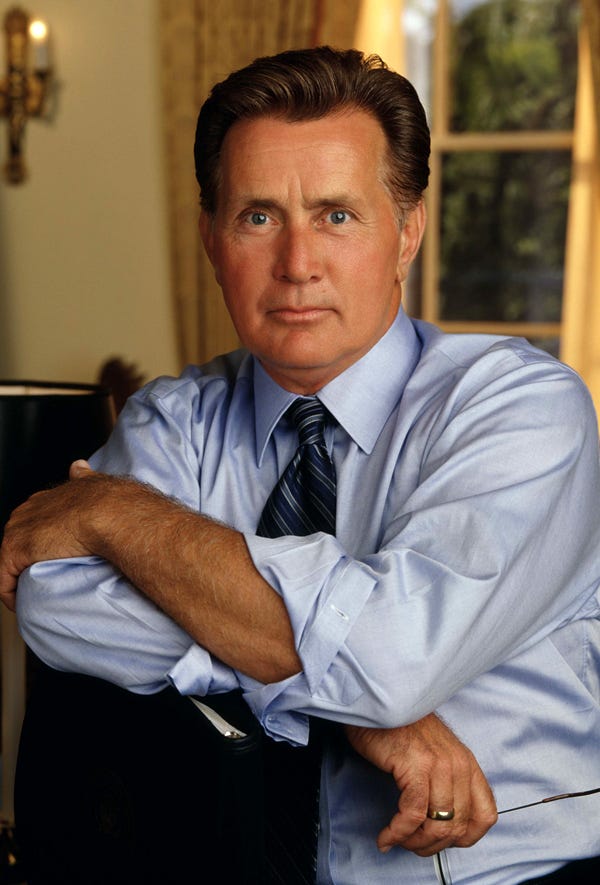SHINE ON MARTIN SHEEN
As long and as varied a career as Martin Sheen has had, he will always be President Jed Bartlet from his seven-year run on The West Wing. With the current battle for who’ll be in the White House for the next four years draining our very souls, enjoy some time reading about the actor who gave us a Commander-in-Chief who felt more real than what passes for real these days, in today’s “Theatre Yesterday and Today.”
Martin Sheen showed up in a movie I was watching last night. Nothing strange about that; at eighty years of age he’s been showing up in movies for the past fifty-three years; ever since he made his debut in a tense, low-budget thriller The Incident (1967). Prior to that, he had guest starred on everything from As the World Turns to My Three Sons to Flipper. But it got me to thinking how impressive it is that he eventually would come to work with film directors of such imposing bodies of work as Terrence Malick, Mike Nichols, Francis Ford Coppola, Richard Attenborough, John Schlesinger, Oliver Stone, Rob Reiner, Steven Spielberg, Martin Scorsese, Ava DuVernay and Warren Beatty. Not to mention, that when for the first time in his long career he finally agreed to take on a TV series in 1999, it turned out to be The West Wing, with his portrayal of President Jed Bartlet earning him six Best Actor Emmy nominations over its seven seasons.

One of the reasons Sheen is so prolific is that he genuinely likes to work. If you look at his more than 250 credits on IMDB, you will see that he has rarely taken much time off (not to mention sporadic returns to his stage roots). Only last year, Grace and Frankie, in which he co-starred with Jane Fonda, Lily Tomlin and Sam Waterston over seven seasons, ended its run on Netflix after a record-breaking ninety-four episodes for the streaming service. Of course, Sheen has gone on to shoot two movies since then.
Martin Sheen, born Ramón Gerard Antonio Estévez, is the son of immigrants; his mother was born in Borrisokane, County Tipperary, Ireland and his father in Salceda de Caselas, Galicia, Spain. Raised in Dayton, Ohio, Sheen was the seventh of ten children (nine boys and a girl) and suffered from polio as a child. His mother died when he was eleven and Sheen has spoken of his Catholic faith helping him every step of the way throughout a tumultuous childhood. It was actually a loan given to him by a priest that enabled him to come to New York at the age of twenty to try and see if he could become an actor. In fact, the changing of his name for show business purposes was a salute to Fulton J. Sheen, a famous American Archbishop of his time. “He was remarkable,” Sheen has said. “His delivery was like that of a Shakespearean actor.” Never changing it legally, Sheen’s driver’s license still reads Ramon Estévez, with the reasoning behind a stage name being, in Sheen’s own words, “That it’s difficult enough trying to get started as an actor, and my name kept throwing people — they couldn’t pronounce it. I thought, ‘I’ve got enough problems, I can’t be bogged down with this name.’”
His earliest stage success came two years into his time in New York when, in 1961, he made his stage debut in a 3-character off-Broadway drama by Frank D. Gilroy titled The Subject Was Roses. Good reviews prompted the producers to try and move it, but it took three years, happily resulting in a Broadway production in 1964 with Sheen and the same two actors, Jack Albertson and Irene Dailey. The play won the Tony Award, the Pulitzer Prize and was made into a 1968 film (with Sheen repeating his stage performance). Just as an aside, his understudy during the Broadway run was another up and coming young actor: Dustin Hoffman.

Hoffman’s big break came when he was thirty with The Graduate in 1967. For Sheen, his performance in Terrence Malick’s Badlands in 1973 could have done the same (he was thirty-three at the time), but it didn’t because it wasn’t anything close to the box office success The Graduatewas, serving as it did to catapult Hoffman to stardom. Another starring role came Sheen’s way when, in 1976, he replaced Harvey Keitel two weeks into the filming of Apocalypse Now. But by the time the lengthy and physically strenuous shoot (sixteen months with over two hundred hours filmed), was finished, the director Francis Coppola took another couple of years to edit, not releasing it until 1979. By then, Sheen was thirty-nine.

During Apocalypse Now, the extraordinary difficulties of the working conditions in the northern Philippines, coupled with Sheen’s hard drinking, led to a heart attack with Sheen’s brother Joe flown in to serve as a body double. The whole episode felt like hitting bottom, and Sheen credits his wife, the former Janet Templeton, to whom he’s been married now for fifty-nine years, with getting him through things (he also double downed on devoting himself to his religion). One West Wing story that Sheen tells, illustrates how his Catholicism influences his personal and creative world.
“All I asked for were two things. One, that the President would be Catholic and two, that he had a Notre Dame degree (I love Notre Dame and I love being a Catholic). But being a Catholic, for me, in that show meant that Bartlet would frame all of his decisions, public and private, in a moral frame of reference. He would have to take a deeply personal responsibility for his actions, whatever the issue was. And I wanted that specifically and Aaron Sorkin said, “absolutely.’”
A longtime political activist, Sheen has estimated being arrested more than sixty times. In a recent oral interview, he described how far back he goes in fighting for social justice:
“I saw the effect of social injustice in my own life in a deeply personal way. I started caddying when I was nine-years-old at this exclusive country club in Dayton, Ohio and so I saw how the upper crust lived. And I experienced the degradation, if you will, of being a servant to the overprivileged and I did it for five years. And when I was fourteen, I organized a caddy union and we went out on strike. The entire adventure only lasted about 72 hours, but it was a life-changing experience for me because we were striking for better wages and working conditions… it was the second-longest job I ever had. The longest was The West Wing.”
On West Wing, my research took me someplace I’ve never been and that was to the story that the role of the President was first offered to Sidney Poitier (wrap your mind around THAT for a minute or two). As Sheen tells it:
I was the last one to join the cast and when I started it was just a peripheral character — the focus was to be on the staff, not the First Family. When I did the pilot, my contract was for just three years and it was confined to maybe three or four episodes every season. The only restraint I had was that I could not play another President while the show was on the air. So, I kind of backed into one of the great events of my life and certainly my career. I only had one sequence in the pilot: I came in at the end and confronted the conservative right wing religious element and brought them low. But the lead-up to the character was so strong, it was so clear what kind of person occupied this office. It was a set-up like no other entrance I’d ever played in my life.
Sheen also played an openly gay man in a groundbreaking 1972 television movie That Certain Summer. The teleplay was by Richard Levinson and William Link (already famous for having created Columbo) and told the story of a man (Hal Holbrook) leaving his wife (Hope Lange) for another man (Sheen). It was highly rated, won a number of awards, and made it clear to millions that two men could love each other without being deviants worth shunning. In a 2007 interview, Sheen was asked about That Certain Summer (thirty-five later) and whether he was concerned at the time whether playing a gay man might have hurt his career. He told the reporter:
“Some people had said that to me. Well, I had played killers before that. I’d massacred people by the scores. I’d robbed banks and kidnapped children and raped women and murdered people, you know, in any number of shows. Now I was going to play a gay guy and that was like considered a career ender. Oh, for Christ’s sake! What kind of culture do we live in? That’s the problem. Please!”

That’s Martin Sheen: outspoken, no-nonsense and forthright, qualities that have served him well in a variety of roles over a career of sixty years and still going strong. Track down some of his more memorable performances in Badlands (1973), The Execution of Private Slovik (1974) and, of course, Apocalypse Now (1979) and appreciate the special qualities he offers, drawn from a life well-lived.

Oh, and one last thing. For those who’ve been begging for more West Wing:

If you enjoy these columns, check out Up in the Cheap Seats: A Historical Memoir of Broadway, available at Amazon.com in hardcover, softcover and e-book. And please feel free to follow me on Medium or email me with comments or questions at Ron@ronfassler.org.
